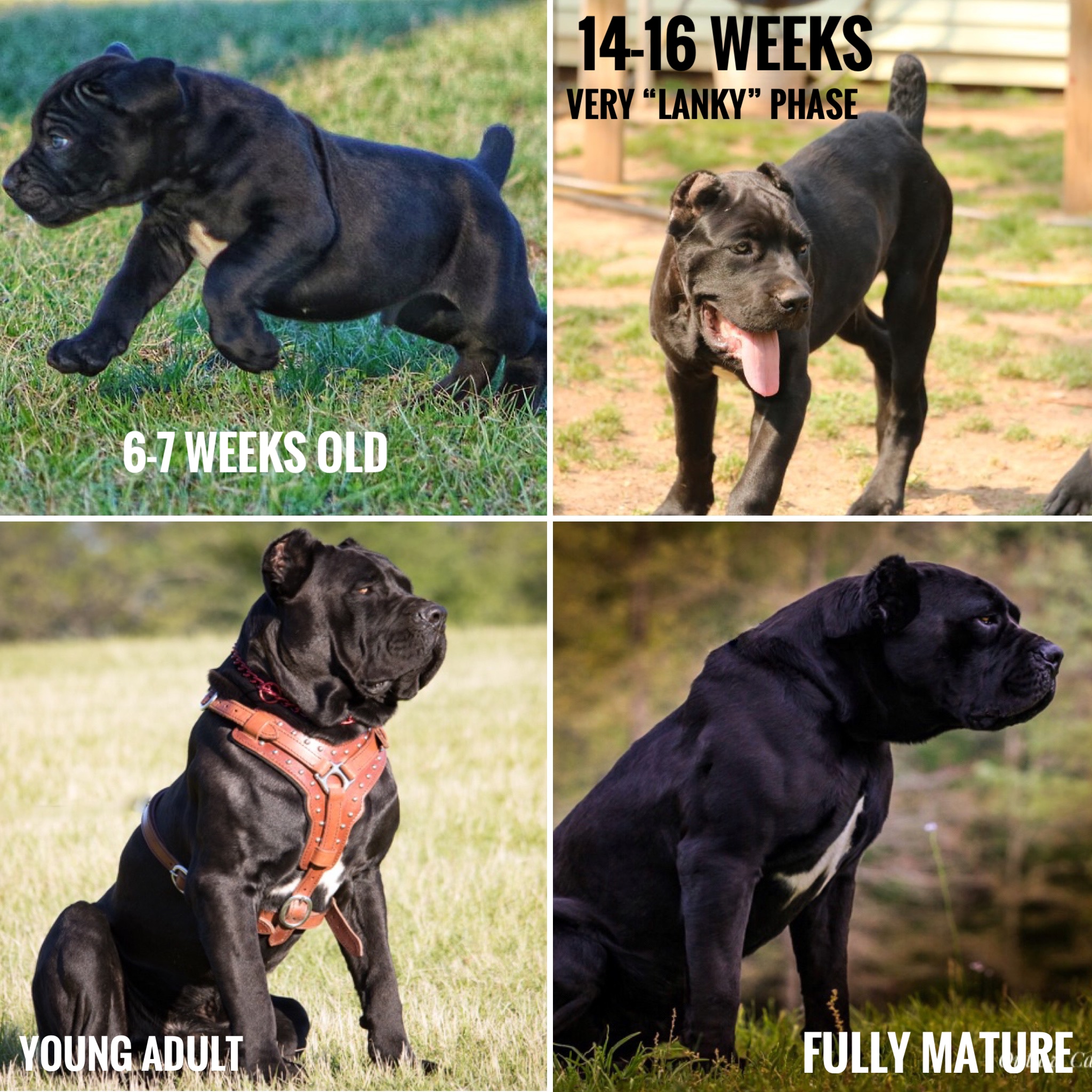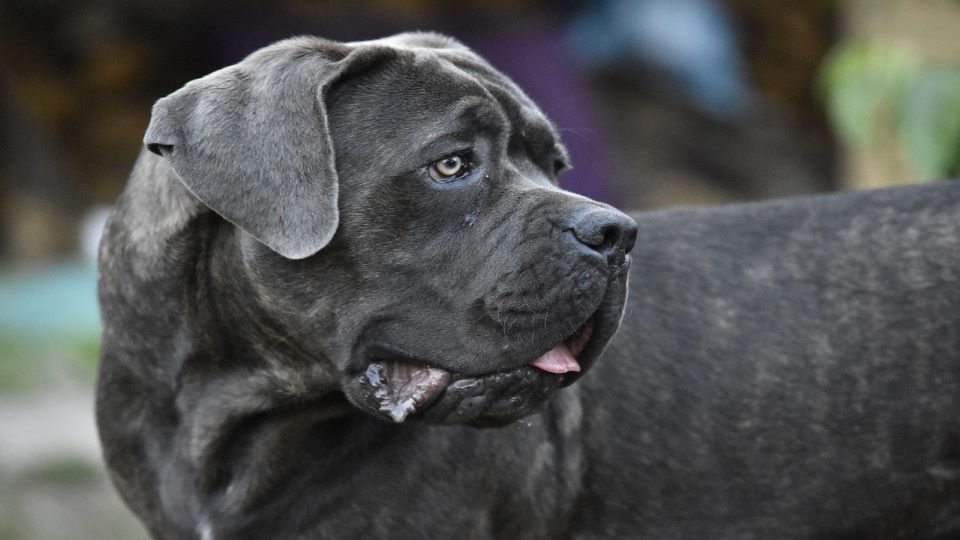When will my Cane Corso stop growing? It’s a common question among dog owners who want to know how big their furry friend will get. Well, here’s a surprising fact: Cane Corsos are considered a large breed, and they can take quite some time to reach their full size.
On average, Cane Corsos stop growing between 18 to 24 months of age. However, the growth rate can vary depending on factors such as genetics, diet, and overall health. It’s important to provide your Cane Corso with a balanced diet and regular veterinary check-ups to ensure their growth is progressing as it should. Remember, patience is key when it comes to the growth of your furry companion. They may still have some growing to do!
Cane Corsos typically stop growing between 18 to 24 months of age. However, their growth rate may slow down after their first year. It’s important to provide proper nutrition and exercise during this time to support their healthy development. Regular vet check-ups can also help track your Cane Corso’s growth progress. Remember, every dog is unique, so their growth may vary slightly.

When Will My Cane Corso Stop Growing?
Cane Corsos are large and powerful dogs that belong to the mastiff family. As a dog owner, it’s important to understand their growth process to ensure their proper development and care. One common question that many Cane Corso owners have is, “When will my Cane Corso stop growing?” Let’s explore the key factors that influence their growth and when you can expect your Cane Corso to fully mature.
Factors Influencing Growth
The growth rate of a Cane Corso can be influenced by several factors including genetics, nutrition, and overall health. Genetics plays a significant role in determining the size and growth potential of your Cane Corso. If both parents are large and have a slow growth rate, it’s likely that your Cane Corso will also have a similar growth pattern.
Nutrition is another crucial factor in a Cane Corso’s growth. Providing a balanced diet that is rich in essential nutrients, vitamins, and minerals is important for their overall development. It’s recommended to feed your Cane Corso a high-quality, age-appropriate dog food that meets their nutritional requirements.
The overall health of your Cane Corso can also affect their growth rate. Regular veterinary check-ups, vaccinations, and proper healthcare practices are essential to ensure that your dog remains healthy and experiences proper growth.
Typical Growth Stages
Cane Corsos generally go through several growth stages, and the timing of these stages can vary slightly from dog to dog. Here are the typical growth stages of a Cane Corso:
- Puppy Stage: From birth to around 6-8 months, your Cane Corso will experience their most rapid growth. During this stage, they will gain weight and height at a significant rate.
- Adolescent Stage: From 6-8 months to around 18 months, your Cane Corso will continue to grow but at a slower rate compared to the puppy stage. Their bones will start to develop and strengthen.
- Adult Stage: Around 18 months to 2 years, most Cane Corsos reach their full height and weight. However, their muscles and body composition may continue to develop, and they may fill out more.
Average Size and Weight
Cane Corsos are known for their large and muscular build. On average, male Cane Corsos reach a height of 24-28 inches (61-71 cm) at the shoulder and weigh between 99-110 pounds (45-50 kg). Females are slightly smaller, measuring 23-26 inches (58-66 cm) and weighing between 88-99 pounds (40-45 kg). Keep in mind that individual dogs may fall outside these averages.
It’s essential to note that larger breeds, like Cane Corsos, may continue to fill out and develop beyond the age of 2 years. Their body composition and musculature may continue to change and mature, even if their height and weight remain relatively stable.
When Will My Cane Corso Stop Growing – Answered
In conclusion, the growth of your Cane Corso will depend on various factors such as genetics, nutrition, and overall health. Typically, Cane Corsos reach their full height and weight by around 18 months to 2 years of age. However, their muscles and body composition may continue to develop beyond this age. It’s important to provide your Cane Corso with proper nutrition, regular veterinary care, and a healthy lifestyle to support their growth and overall well-being.
Key Takeaways: When Will My Cane Corso Stop Growing?
- Cane Corsos are large and powerful dogs known for their intimidating presence.
- Their growth rate varies, but most Cane Corsos reach their full height by around 12 to 18 months.
- However, it can take up to 24 months or more for them to fully mature and reach their adult weight.
- Nutrition and exercise play important roles in their growth and development.
- Regular visits to the veterinarian are essential to ensure your Cane Corso is growing in a healthy manner.
Frequently Asked Questions
In this section, we will answer some common questions related to the growth of Cane Corso dogs.
1. At what age do Cane Corsos stop growing?
Cane Corsos typically stop growing between 18 months and 2 years of age. During this time, they will reach their full height and weight. However, it’s important to note that individual dogs may have slight variations in their growth patterns. Some may finish growing earlier, while others may take a bit longer.
It’s crucial to give your Cane Corso a well-balanced diet during their growth period to support healthy bone development. Consult with your veterinarian to ensure you are providing the appropriate nutrition for your dog’s specific needs.
2. How can I tell if my Cane Corso is still growing?
There are a couple of ways to determine if your Cane Corso is still growing. First, you can observe changes in their height and weight. If you notice that your dog is still gaining height and gradually filling out, it’s likely that they are still in their growth stage.
Additionally, you can consult with your veterinarian who can examine your dog’s growth plates. X-rays can be taken to assess the closure of the growth plates, indicating that your Cane Corso has stopped growing.
3. What factors can affect the growth of my Cane Corso?
Several factors can influence the growth of a Cane Corso. Genetics play a significant role, as dogs from larger parents tend to grow larger themselves. Nutrition is also crucial, as a well-balanced diet supports proper growth and development. Additionally, exercise and physical activity levels can impact a dog’s growth by promoting muscle development and overall fitness.
Health conditions or illnesses can also affect growth. If you have any concerns about your Cane Corso’s growth, it’s best to consult with your veterinarian for a thorough evaluation and guidance.
4. Can I predict the adult size of my Cane Corso based on its puppy size?
While the size of a Cane Corso puppy can provide some indication of their potential adult size, it’s not always accurate. Growth rates can vary among puppies, and factors such as genetics and nutrition can greatly influence how a Cane Corso develops.
It’s best to consult with a reputable breeder, who has experience with the breed and can provide more insight into the potential size of the puppy based on their lineage. However, keep in mind that it’s difficult to predict the exact adult size of a Cane Corso with complete certainty.
5. Are there any signs that my Cane Corso has finished growing?
There are a few signs that can indicate your Cane Corso has finished growing. One sign is that their weight has stabilized, and they are no longer gaining pounds. Another sign is that their growth plates have closed, which can be confirmed through X-rays by a veterinarian.
Keep in mind that even after a Cane Corso has finished growing, they will continue to mature mentally and physically. It’s important to provide ongoing care, including a balanced diet, regular exercise, and mental stimulation, to ensure their overall well-being.

When it comes to the growth of a Cane Corso, it’s important to understand that this breed tends to have a slower growth rate compared to some other dog breeds.
Typically, a Cane Corso will continue to grow until they are about 12-18 months old, with most of their significant growth occurring in the first year.
